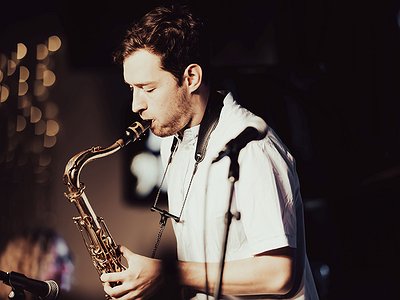Name: Jonathan Reisin
Nationality: Israeli, Based in Brooklyn NY
Occupation: Saxophonist, composer, improviser
Current release: Jonathan Reisin teams up with Francisco Mela for Earthquake, out October 20th via 577.
If you enjoyed this Jonathan Reisin interview, and would like to find out more about his music, visit his official homepage. He is also on Instagram, Facebook, and bandcamp. For an even deeper look into his thoughts on improvisation and collaboration, read our previous Jonathan Reisin interview.
What was your first encounter with the saxophone? What was it about it that drew you in?
I began my musical journey at the age of six, and although I'm now recognized as a saxophonist, it wasn't my first instrument.
My grandfather, Jacob, wanted me to play the violin because he used to play it as a child until the Nazis took it away during the Holocaust. In an effort to give me the opportunity he never had, he bought me a violin, and I started taking lessons at the conservatory in my hometown of Rosh Haaiyn, a small town in the center of Israel.
Playing the violin was challenging for me as a kid, and even though my teacher, Vladimir, was a great player who took care of me like I was his own grandson, I didn't enjoy it as much as I thought I would. I found it hard and didn't have any friends who played the instrument. Eventually, I realized that being a classical musician wasn't my true passion.
When I entered high school, I only had one school option for studying music. I auditioned for the program in the summer between 9th and 10th grade with my violin, but they needed a saxophonist for their funk and gospel band.
I switched to the saxophone and began my journey as a saxophonist.
Tell me about the process of learning to play the instrument and your own explorations with it.
I was inspired to learn the saxophone by my first teacher, Jess Koren, who is a well-known figure in the Israeli music scene, and part of the old generation of jazz musicians in the country.
As I continued my journey, I found that three key elements have stayed along during my progress: exploring different sounds, listening intently, and practicing melody. These aspects remain crucial to my ongoing learning process.
What, to you, are some of the most interesting saxophone recordings and -performances by other artists in terms of your personal development?
There are so many albums that influenced my personal development.
One that I can point out that influenced me a lot during the time of recording the album Earthquake with Francisco Mela and was an inspiration to the album is Real Deal by David Murray and Milford Graves.
There’s something about this album that makes me have goosebumps every time I hear it and fills me with new energy. That is what we tried to achieve in our album.
Which artists, approaches, albums or performances involving prominent use of improvisation captured your imagination in the beginning?
My journey with the saxophone began with a deep admiration for the early jazz saxophone legends such as Lester Young, Coleman Hawkins, and Ben Webster. Their amazing ability to improvise had a lasting impact on my musical taste.
The first solo I played by Lester Young, "Blue Lester," was a transformative experience for me. It revealed the connection between improvisation and imagination, which has continued to guide me throughout my musical career.
These pioneers inspired my love of the saxophone and sparked my lifelong interest in improvisation.
Some see instruments merely as tools towards creativity, others feel they go hand in hand. What's your take on that?
I believe that instruments are much more than just tools for creativity; they are essential partners in the creative process. When it comes to making music, the instrument becomes an extension of the artist's voice and expression.
As a saxophonist, I rely on the rich and expressive sound of my instrument to convey the emotions and stories I want to tell through my music. It's not just a tool; it's the medium through which I communicate. Instruments often inspire creativity. When I pick up my saxophone, I often find myself exploring new musical territories and stumbling upon unexpected sounds and phrases that lead to exciting compositions.
Every musician's relationship with their instrument is deeply personal, shaping their musical identity. The way I play the saxophone is a reflection of who I am as an artist. It's not just about technical proficiency; it's about the unique nuances and subtleties I bring to the instrument.
My saxophone playing is an extension of my personality and experiences, and it distinguishes me from other musicians.
In the light of picking your instrument, how would you describe your views on topics like originality and innovation vs perfection and timelessness in music? Are you interested in a “music of the future” or “continuing a tradition”?
I embrace both tradition and innovation in music. Tradition provides a valuable foundation and inspiration, while innovation keeps music vibrant and relevant. I'm interested in pushing boundaries to create new sounds.
One of my inspirations for my work is my grandfather whom I dedicated my first album Option B, Dr. Jacob Baal Schem, who led a meaningful life made of a deep understanding of his roots and a constant search for future innovations. This is part of my DNA.
Instrument design is an ongoing process. Are you interested in recent developments for the saxophone in this respect?
I am highly interested in any new developments for the saxophone and I am always willing to explore innovative tools, but I prefer to avoid any developments that take the saxophone away from being an acoustic instrument, such as effects or electronic instruments.
Instead, I enjoy experimenting with traditional saxophones and being inspired to create similar sounds to those produced by the new electronic instruments.




